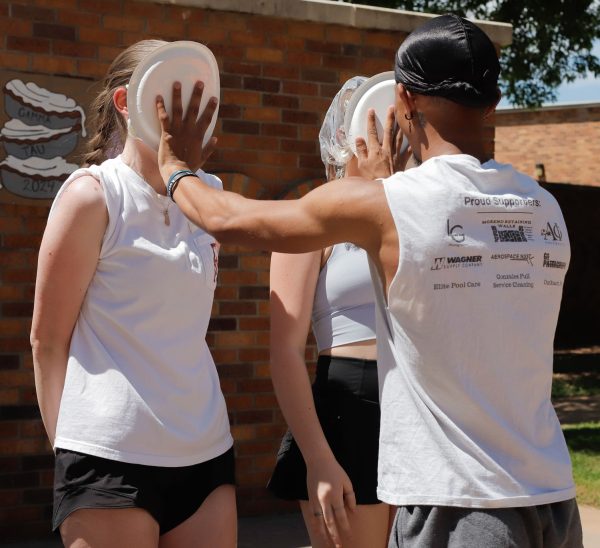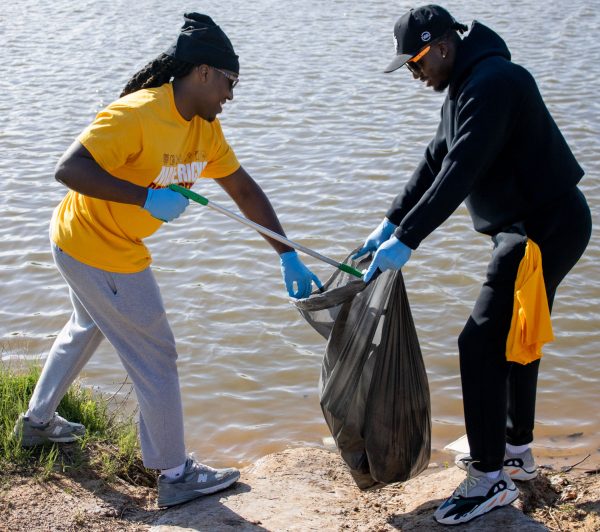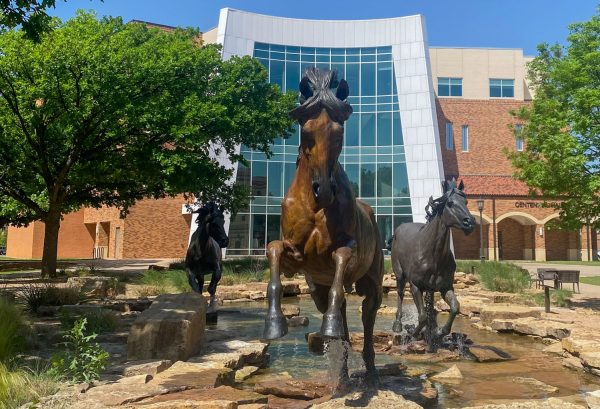Students volunteer to keep campus clean
A gentle wind blows through branches causing some leaves to fall onto the grass below. A sunny afternoon at nice and cleaned up Sikes Lake provides a place for students to enjoy nature. Some sit under the small pavilion near some trees while others can take a stroll around the trail. Since the yearly clean-up in September, the Rolling Plains Chapter have been inviting students to take part in volunteer opportunities for the need to keep the environment clean.
Terry McKee, president of the Rolling Plains Chapter Texas Master Naturalist said, “It’s important for people to come out and clean up the community since of course we live here. Keeping it clean improves our quality of life for not only us but for the future of the community.”
Students agree that it’s important to take care of the environment as well.
Matt Graham, mechanical engineering sophomore said, “We don’t want the environment to be dirty just like we don’t want our home to be dirty.”
Shea James, art freshman feels its important if we want to live here for the long run.
She said, “We don’t want to destroy the earth, and it’s good to help others with achieving just that.”
To encourage students to take part in cleaning up the environment, McKee invites students to take part in a great opportunity that will not only help the environment but also strengthen their knowledge.
She said, “When you’re out doing good in nature, you’re out doing good for yourself as we invite students to our classes to become a certified Texas Master Naturalist for people that are interested.”
The Rolling Plains Chapter offers classes taught by MSU professors in the biology department each spring. It opens doors to many volunteer opportunities for students as well.
McKee said, “It gives people the information of what they can do for the community and that in turn teaches them about the importance of keeping the environment clean.”
Being a part of the Texas Master Naturalist program develops local volunteers who provide educational and outreach services aimed at the better management of natural resources while enhancing the natural areas within their communities. Individual volunteers bring a wealth of talents, skills, visions and experiences to share with others.
McKee said, “We offer students the opportunity to participate in clean-ups at Lake Arrowhead, Plum Lake and Sikes Lake. We help with kid fishing projects and the after school campfire program. We do lots of sponsored projects with the Texas Parks and Wildlife department as well as Nature Tracker programs.”
In all, being a Texas Master Naturalist as well as even being in the process of becoming one can provide a lot of hands-on training with different kinds of nature projects. It gives students the chance to want to learn, experience and further help out their future career in the Biology department. Not only do they just do outdoor clean-ups and learn more about the environment, they also provide the opportunity to study and work with animals as well.
McKee said, “We do horned lizard and prairie dog surveys. Also, we do lots of bird watching and bio-blitz which is following and counting a number of a certain animal species at the Lake Arrowhead State Park as well.”
McKee describes the process of becoming a Texas Master Naturalist.
She said, “It costs $100 to take the classes from the beginning of March to the beginning of May which are held on campus in the Bolin Science Hall. Once those classes are completed, you’re a member of the Texas Master Naturalist chapter for the rest of the year. Each year to recertify as a Master Naturalist, you must give 40 hours of volunteer time and get 8 hours advanced training provided by the chapter with guest speakers and several programs.”
The Texas Master Naturalist program describes it as although a state curriculum the cornerstone of instruction, each chapter provides instruction relevant to the local ecosystem and issues. Field trips are led by experts as well as certified Master Naturalists with students and members having the opportunity to learn from and work along-side scientists. Land stewards and other experts help carry out the mission of the Master Naturalist program.
The program has an esteemed reputation as it has earned more than 30 national, state and local awards. According to the Texas Master Naturalist, in the past 10 years, the program has earned the U.S. Department of Interior’s “Take Pride in America” award in 2005. In 2010, it has earned the Alliance of Natural Resources Outreach and Service Program’s “Program of the Year” Award. In 2014, the organization earned the TCEQ Texas Environmental Excellence Civic/Community Award as well as the Governor’s Volunteer Award-Community Leadership Award.
Savannah Mueller, radiology freshman, is interested in the program for the experiences it can provide.
She said, “This sounds fun to do since it’s outside with animals and experience the wildlife as well as nature.”
Maritza Ferretiz, biology sophomore feels this would look good on a person’s resume pursuing a career that pertains to biology.
She said, “Just being certified as a Texas Master Naturalist can look good for people that want to be a zoologist or a career in biology too. It can help those people be ahead of others when getting considered for a certain job.”
McKee hopes that students don’t overlook this opportunity as not only does it help the environment but it can bring the community together as well as having beneficial effects on the person itself.
She said, “Volunteering and helping the environment can help students feel a sense of community as being a part of these clean-ups bring a sense of belonging as well. Going outside and being around nature is a good way to keep your brain young as it’s easy to suffer burnout from school while improving your thinking processes.”
According to Harvard Health Publishing, spending time outdoors has discernible benefits for physical and mental health as it can help people become happier and concentration will improve.
Spending time in nature has been shown to lower stress levels, as Environmental Psychologist Judith Heerwagon said, “Just looking at a garden or trees or going for a walk, even if it’s in your own neighborhood, reduces stress. I don’t think anyone understands why, but there’s something about being in a natural setting that shows clear evidence of stress reduction, including physiological evidence like lower heart rate.”











